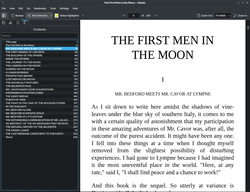| Okular | |
|---|---|
| | |
 Okular displaying a PDF file on KDE Plasma 5 | |
| Original author | Piotr Szymański |
| Developer | KDE |
| Initial release | 2005 [1] [2] |
| Stable release | |
| Preview release | |
| Repository | |
| Written in | C++ |
| Operating system | Linux, Unix-like, Windows |
| Type | Universal document viewer |
| License | GPL-2.0-only or GPL-3.0-only |
| Website | okular |
Okular is a free and open source multiplatform document viewer developed by the KDE community based on the Qt and KDE Frameworks libraries. It is distributed as part of the KDE Applications bundle. It replaced KPDF, its main predecessor, alongside KGhostView, KFax, KFaxview and KDVI in KDE 4. Its functionality can be embedded in other applications.
